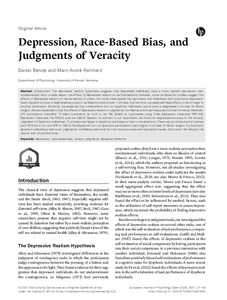| dc.date.accessioned | 2023-10-06T10:33:27Z | |
| dc.date.available | 2023-10-06T10:33:27Z | |
| dc.date.issued | 2023-07-26 | |
| dc.identifier | doi:10.17170/kobra-202310058825 | |
| dc.identifier.uri | http://hdl.handle.net/123456789/15101 | |
| dc.description.sponsorship | Gefördert durch den Publikationsfonds der Universität Kassel | |
| dc.language.iso | eng | |
| dc.rights | Namensnennung 4.0 International | * |
| dc.rights.uri | http://creativecommons.org/licenses/by/4.0/ | * |
| dc.subject | depression | eng |
| dc.subject | race-based bias | eng |
| dc.subject | veracity judgements | eng |
| dc.subject | deception detection | eng |
| dc.subject.ddc | 150 | |
| dc.title | Depression, Race-Based Bias, and Judgements of Veracity | eng |
| dc.type | Aufsatz | |
| dcterms.abstract | The depressive realism hypothesis suggests that depressed individuals have a more realistic perception than nondepressed. Most studies depict the effects of depressive realism on self-perceptions. However, some lie detection studies suggest the effects of depressive realism on the perception of others. Our study investigated the hypothesis that individuals with subclinical depression levels (dysphoric) show a heightened accuracy in lie detection and a lower truth bias. Furthermore, we expected these effects to be stronger in positive statements. Moreover, we expected that nondysphoric but not dysphoric individuals would show a heightened truth bias for Black targets. We also expected to find the effects of depressive realism in judgmental confidence and in self-evaluations of performance. Methods: 472 participants classified 16 video statements as truth or lie. We tested all hypotheses using three depression measures: IPIP-300 Depression Subscale, the PHQ-9, and the CES-D. Results: In contrast to our hypothesis, we found no heightened accuracy in the veracity judgments of dysphoric individuals. Truth bias was higher in dysphoric participants than in nondysphoric. There was an interaction of valence with PHQ-9 but not with IPIP or CES-D. Nondysphoric but not dysphoric participants had a higher truth bias for Black targets. Furthermore, dysphoric individuals had lower judgmental confidence and lower but not more accurate self-evaluation values. Conclusion: We discuss the results and future directions. | eng |
| dcterms.accessRights | open access | |
| dcterms.creator | Benz, Daniel | |
| dcterms.creator | Reinhard, Marc-André | |
| dc.relation.doi | doi:10.1024/2673-8627/a000040 | |
| dc.subject.swd | Ethnozentrismus | ger |
| dc.subject.swd | Depression | ger |
| dc.subject.swd | Urteil | ger |
| dc.subject.swd | Wahrhaftigkeit | ger |
| dc.type.version | publishedVersion | |
| dcterms.source.identifier | eissn:2673-8627 | |
| dcterms.source.issue | Heft 1 | |
| dcterms.source.journal | European Journal of Psychology Open | eng |
| dcterms.source.pageinfo | 31-43 | |
| dcterms.source.volume | Jahrgang 82 | |
| kup.iskup | false | |


